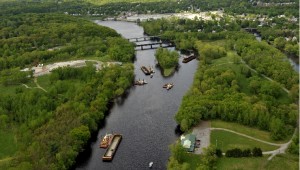The village of Fort Edward may be small, but it’s determined to preserve the historic island considered to be the birthplace of the U.S. Army Rangers.
Roger’s Island, found north of Albany in the middle of the Hudson River, is a place with a long and storied history. Listed in the National Register of Historic Places, the island was strategically located for military camps; first turned into an island fortress by the British during the French and Indian War in the mid-18th century, the military base was so extensive that the neighbouring town, now a mere hamlet, became at the time the third largest community in the growing American colony.
The most famous inhabitant of Roger’s Island, and the man for whom the island was named, was the celebrated Robert Rogers, founder of the Army Rangers and the invaluable guerilla-tactic manual Robert’s 28 Rules of Ranging. His rules, first created while he was fighting on the side of the British during the French and Indian War, then later honed as he battled the British in the Revolutionary War, still form the basis of the all U.S. Army Ranger activities today. On the island parcel the town wants to acquire, archeologists have discovered more than 200 boxes of musket balls, canteens, and many other remnants of the military encampment, with an estimated value of $700,000.
It’s no wonder then, that Roger’s Island is seen as a historic treasure to be preserved; however, due to the budget crunch afflicting the New York State government, a move to purchase and conserve an outstanding parcel of woodland on the island was cancelled. Republican state senator Elizabeth Little said she had been working for eight years to put the island property into the public domain, planning to buy the land and turn the management of it over to the town. Now, it appears that the town of Fort Edward will need to get involved in the fundraising efforts.
Under the new plan, the town would have any funds they raised matched by a state grant program, and Fort Edward has already applied for a $400,000 grant to cover some of the price. The parcel is currently owned by the Nastasi family, and the town and state have been involved for years in talks over acquiring the land. According to a report in the Wall Street Journal, it seems that the town has time on their side, thanks to the patience of the owners. “Like we’ve been doing for the past three years, we’re sitting and waiting patiently,” said Anthony Nastasi in a telephone interview by the WSJ. “It won’t be going to private hands.”
Read more about this story: Wall Street Journal




